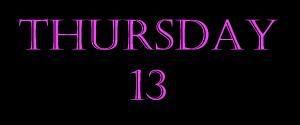Banned Books Week day 6!


I've spent this week celebrating Banned Books Week - so I'm carrying it over to my Thursday 13. Let's see I've talked about the books that were challenged/banned for 2006-07, weird challenges, self-appointed censors, religion and politics, women and sex...how about we look at 13 challenges that make you go hmmm. Personally, I like to keep it positive so I promise to make sure some of them were retain :-)
1. Abernathy, Rev. Ralph D. And the Walls Came Tumbling Down. Harper. Burned in protest in Denver, Colo. (1989) because it alleges that Martin Luther King, Jr. was involved with three women. E. Napolean Walton, publisher of the Denver Cosmopolitan Advertiser, stated: “[Abernathy] has his freedom of speech, and we have our freedom to burn it.”
2. Bradbury, Ray. Fahrenheit 451. Ballantine. Expurgated at the Venado Middle School in Irvine, Calif. (1992). Students received copies of the book with scores of words - mostly “hells” and “damns” - blacked out. The novel is about book-burning and censorship. After receiving complaints from parents and being contacted by reporters, school officials said the censored copies would no longer be used. Challenged at the Conroe, Tex. Independent School District (2006) because of the following: “discussion of being drunk, smoking cigarettes, violence, ‘dirty talk’, reference to the Bible, and using God’s name in vain.” The novel went against the complainants’ “religious beliefs.”
3. Carter, Judy. The Homo Handbook: Getting in Touch with Your Inner Homo. Fireside. Challenged in the Fayetteville, Ark. High School library (2005). The complainant also submitted a list of more than fifty books, citing the books as too sexually explicit and promoting homosexuality.
4. Cervantes Saavedra, Miguel de. Don Quixote. Methuen; NAL; Norton; Random. Placed on the Index in Madrid for one sentence: “Works of charity negligently performed are of no worth.” In 1981 the Chilean military junta banned the novel for supporting individual freedom and attacking authority.
5. Fitzgerald, F. Scott. The Great Gatsby. Scribner. Challenged at the Baptist College in Charleston, S.C. (1987) because of “language and sexual references in the book.”
6. Frank, Anne. Anne Frank: The Diary of a Young Girl. Modern Library. Challenged in Wise County, Va. (1982) due to protests of several parents who complained the book contains sexually offensive passages. Four members of the Alabama State Textbook Committee (1983) called for the rejection of this title because it is a “real downer.” Removed for two months from the Baker Middle School in Corpus Christi, Tex. (1998) after two parents charged that the book was pornographic. The book was returned after students waged a letter-writing campaign to keep it, and a review committee recommended the books retension.
7. Homer. The Odyssey. Airmont; Doubleday; Harper; Macmillan; NAL; Oxford Univ. Pr; Penguin. Plato suggested expurgating Homer for immature readers (387 B.C.) and Calligula tried to suppress it because it expressed Greek ideals of freedom.
8. Keefer, Edward C., ed. Foreign Relations of the United States 1964-68, Volume XXVI, Indonesia, Malaysia-Singapore, Philippines. U.S. State Department. The U.S. government recalled all copies of the U.S. State Department history book from hundreds of libraries in the U.S. and abroad (2001) because it details the U.S. role in Indonesia’s deadly purge of communists in the 1960’s. The prestigious series, which began in 1861, is often embattled. For example, the history dealing with Greece, Cyprus, and Turkey was printed in February 2000, but is locked up at the Government Printing Office under the label: “Embargo: This publication cannot be released.” Officials declined to say why.
9. Lee, Harper. To Kill a Mockingbird. Lippincot/Harper; Popular Library. [The challenges started in 1977 but I’ll limit this to the last challenge.] Challenged at the Brentwood, Tenn. Middle School (2006) because the book contains “profanity” and “contains adult themes such as sexual intercourse, rape, and incest.” The complainants also contend that the book’s use of racial slurs promotes “racial hatred, racial division, racial separation, and promotes white supremacy.”
10. Miller, Arthur. The Crucible. Penguin. Challenged at the Cumberland Valley High School, Harrisburg, Pa. (1982) because the play contains “sick words from the mouths of demon-possessed people. It should be wiped out of the schools or the school board should use them to fuel the fire of hell.” Challenged as a required reading assignment at the Pulaski County High School in Somerset, Ky. (1987) because it is “junk.” Challenged, but retained in the sophomore curriculum at West Middlesex, Pa. High School (1999).
11. The Treasury of American Poetry. Doubleday. Challenged at the Grenta, Va. High School library (1981) because it contained eight objectionable words. The review committee recommended to cut out pages or ink over the offending words.
12. Tolkien, J.R.R. (John Ronald Reuel). Lord of the Rings. Ballentine; Houghton. Burned in Alamagordo, N. Mex. (2001) outside Christ Community Church along with other Tolkien novels as satanic.
13. Solzhenitsyn, Alexsandr Isayevich. One Day in the Life of Ivan Denisovich. Dutton; Farrar; NAL. Barred from publication in the USSR; the author was stripped of Soviet citizenship and deported (1974). Removed from the Milton, N.H. high school library (1976) due to objectionable language. Challenged in Mahwah, N.J. (1976); Omak, Wash. (1979) and at the Mohawk Trail Regional High School in Buckland, Mass. (1981) because of profanity in the book. Removed from the Lincoln County, Wyo. high school curriculum (1995) because of “considerable obscenities.” Retained at the Storm Lake, Iowa High School, despite objections to the novel’s profanity.
The Anne Frank and Solzhenitsyn books stunned and upset me. With the right guidance and information, kids can learn so much from both these books about people and history [and if you're thinking of sex when reading Anne Frank then you need help]. An interesting day of books to say the least, many of which still make me think. Yes, the challenger was technically right about To Kill a Mockingbird, but weighed against it is what a reader comes away with when they finish, and I can't help but think this book is a must read.
Sigh, like I said, they make you think. Tomorrow were going to look at children's books and see what's happening in that area.
Also, if you comment this week - you're up for a couple of prizes [gift certificates to Amazon being one :-)] so make sure I can reach you by email.
Friday, September 28, 2007
Thursday 13 - #20!
Posted by Tilly Greene at 10:15 PM
Labels: Banned Books Week, personal, thursday thirteen, Tilly Greene
Subscribe to:
Post Comments (Atom)



6 comments:
I can't believe that! Some of those books "To Kill A Mockingbird" and others were required books to read in junior high and high school when I was young. It's amazing what people nowadays will do. Happy TT!
I've been following this all week, Tilly. I really appreciate the time and effort you've put into this.
You can make the same argument for every single book you've listed so far: with a good teacher, there's no need to ban a single one of them. A good teacher will guide the students through it and allow them to draw their own conclusions about whether or not it's objectionable -- which is exactly what the people trying to ban the books fear. That their kids will form their own opinions, and that they'll be different from Mom and Dad's.
Sad. Scary. But mostly sad.
Happy TT!
great tt! banning books is such a slippery slope. what's next- banning thought?!
I'm happy to say I've read 9 out of 13 and most of them in school. When people ask me about what my daughters think and are surprised that we don't have the same opinions on everything I remind them that I raised them to think for themselves above all else and I didn't want little clones of me which I'm afraid is what too many people want.
just in case :) I'm at catslady5@aol.com. I didn't know if once you sign in if that gives you my email or not lol.
I also raised my children to be independent thinkers. With their intelligence I allowed them to choose what they wanted to read.
Post a Comment